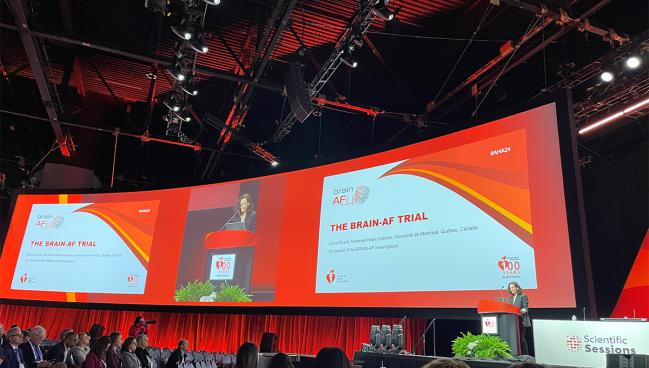Rivaroxaban Doesn’t Cut Cognitive Decline, Stroke, or TIA in Younger AF Patients
(UPDATED) The trial, which was stopped early for futility, raises questions about the link between anticoagulation and neurocognition.

CHICAGO, IL—Giving rivaroxaban (Xarelto; Bayer/Janssen) to adults under the age of 65, after an atrial fibrillation (AF) diagnosis, does nothing to reduce their risk of neurocognitive decline, stroke, or TIA, according to the results of the BRAIN-AF trial.
The finding throws cold water on the idea that initiating oral anticoagulation (OAC) in younger adults with AF who have no other CV risk factors might help them avoid future ramifications—the same rationale used to support their use in AF patients over age 65.
Léna Rivard, MD (Montreal Heart Institute, Université de Montréal, Québec, Canada), presented the BRAIN-AF results during a late-breaking clinical trials session here at the American Heart Association 2024 Scientific Sessions. She noted that a slightly higher dose of rivaroxaban, 20 mg, is guideline recommended for stroke prevention in patients with nonvalvular AF. BRAIN-AF, she said, does not support the use of this agent, even at a lower dose to attenuate bleeding risk, in younger, lower-risk patients.
“In patients with AF at low risk of stroke, anticoagulation with daily rivaroxaban does not reduce the incidence of cognitive decline, stroke, or TIA when compared to placebo,” she concluded.
Speaking with TCTMD, Rivard stressed that the lack of a benefit on cognition is particularly noteworthy, since many had assumed anticoagulation to be a driver of neurocognitive deficits. “There is something [going on] between cognitive decline and atrial fibrillation, even if you're young and without any risk factors,” she said, “but anticoagulation with these drugs will not help you to decrease this risk.”
BRAIN-AF Insights
The trial, designed to enroll over 1,400 patients, was stopped early for futility after the data safety and monitoring committee convened last year, leaving just 1,235 for the final analysis.
During a mean follow-up of 3.7 years, 234 patients experienced cognitive decline (defined as a point decline of 2 or greater using the Montreal Cognitive Assessment [MoCA]), 13 patients had a stroke, and nine a TIA. Rates of the primary endpoint, however, were not significantly different between patients treated with rivaroxaban versus placebo (HR 1.10; 95% CI 0.86-1.40).
Modified intention-to-treat (ITT) and on-treatment analyses were consistent with the overall ITT analysis, and no benefits for anticoagulation were seen for individual secondary outcomes, including bleeds, or by subgroup analysis.
The population studied had no prior stroke or TIA; no hypertension, diabetes, or congestive heart failure; and no other indication for oral anticoagulants, which Rivard told TCTMD makes the amount of cognitive decline, as measured by MoCA, striking and worrisome.
“What we saw is that 18 percent of the population decreased by two points during the trial, and we don't understand why,” Rivard. While some will question the severity or duration of AF in this group, subgroup analyses showed no trend by AF burden. That nearly one in five patients showed this degree of decline is “huge,” said Rivard, “and it’s greater compared to patient in sinus rhythm.”
Looking Further
Experts discussing BRAIN-AF in a press conference prior to Rivard’s main arena presentation also zeroed in on the cognitive decline.
“While this study showed no benefit of prescribing oral anticoagulants for patients who typically don’t meet guideline indications for OAC, it did provide a better understanding of potential mechanisms that may impact on cognitive decline in patients with AF,” said Andrea Russo, MD (Cooper Medical School of Rowan University, Camden, NJ). “This should set the stage for future studies examining cognitive decline or dementia as an important trial endpoint, in addition to classic trial endpoints.”
Similarly, Sana Al-Khatib, MD (Duke University Medical Center, Durham, NC), observed that stroke “is probably the most feared outcome for lot of a people, probably even more than death for some of us. But one thing that we have started to recognize is cognitive decline in patients with atrial fibrillation—it is a known fact. But what is the mechanism and what is the best way to try to lower the risk of cognitive decline in those patients?”
Getting into some of the “granular data” from BRAIN-AF may help answer these questions, she added. “The fact that this patient population was relatively healthy, at low risk for these outcomes, might actually explain a lot of the findings here.”
But Rivard does not think the answer is quite that simple. BRAIN-AF investigators are continuing to analyze their data to see if there are other predictors, she told TCTMD. “At the moment, we don't know who in this population is developing cognitive decline,” she said. Other studies are warranted to see if different medications or AF ablation may help with reducing cognitive dysfunction long term, but for patients similar to those in BRAIN-AF, “At the moment, you just follow the usual rules: no alcohol, sleep well, be careful with all your risk factors and with exercise.”
The BRAIN-AF investigators have MRI data in about one-third of patients, as well as biomarker and genetic data in almost all patients, Rivard noted after her presentation. So many more analyses, she stressed, are forthcoming.
The Brain and the Heart
Following Rivard’s main arena presentation, discussant and neurologist Hooman Kamel, MD (Weill Cornell Medicine, New York, NY), emphasized the complex and evolving understanding of the link between atrial pathology, atrial fibrillation, and neurological pathology.
“It could it be that brain infarcts are not a major mechanism of cognitive impairment in atrial fibrillation, and that’s why anticoagulation does not work,” he speculated, or it might simply be that, by design, this population was too young and healthy for anticoagulation to have an impact.
“I think this trial answers a really important question, that there’s no role for expanding our current indication for anticoagulation to people that we generally don’t treat right now, who are younger and healthier, to try and improve brain health,” he said. But there are new and emerging AF therapies in this space, he added, and it “makes sense” for studies of these to include “broader measures of brain health, not just stroke.”
For now, Kamel concluded, “I think this trial really moves the field forwards in terms of the role of anticoagulation in a younger and healthier population. . . , but we still have a lot of work to do in trying to preserve brain health in older atrial fibrillation patients with vascular disease.”
Shelley Wood was the Editor-in-Chief of TCTMD and the Editorial Director at the Cardiovascular Research Foundation (CRF) from October 2015…
Read Full BioSources
Rivard L. The BRAIN-AF Trial. Presented at AHA 2024. November 16, 2024. Chicago, IL
Disclosures
- Rivard disclosed receiving research/grant support from the Fonds de Recherche en Santé du Québec and the Canadian Stroke Prevention Intervention Network.





Comments